hankyoreh
Links to other country sites 다른 나라 사이트 링크
[Photo] Korean Supreme Court ruling on damages for Japan’s forced labor victims turns 4
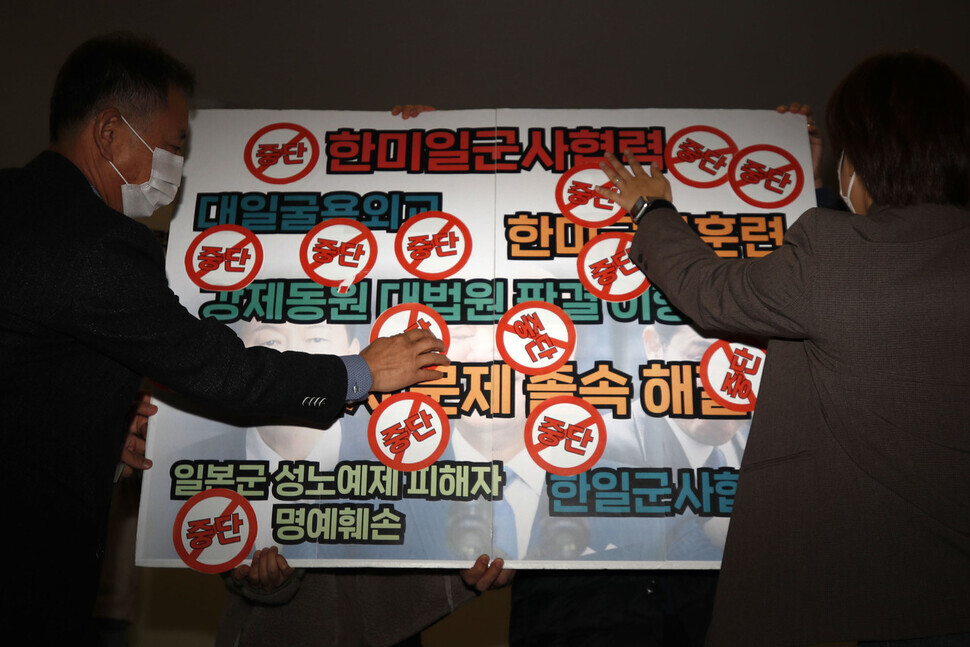
On Tuesday, civic groups from various sectors accused the South Korean government of rushing to patch over the issue of Koreans forced to provide labor during the Japanese colonial period and demanded that the government stop groveling to Japan. Oct. 25 was just five days before the fourth anniversary of the South Korean Supreme Court ruling that ordered Japanese companies to pay damages to victims of forced labor.
A press conference marking the fourth anniversary of that ruling was held at the Franciscan Education Center, in downtown Seoul, on Tuesday morning, featuring statements from people in various sectors denouncing President Yoon Suk-yeol’s policy of kowtowing to Japan and calling for a halt to South Korean military cooperation with Japan, both bilaterally and trilaterally with the US. The speakers also criticized the Yoon administration for attempting to complete a military alliance with Japan without adequately resolving outstanding historical issues.
The press conference was organized by two groups: the South Korean Committee to Actualize the June 15 Joint Statement, and the Campaign for Peace and Historical Justice for South Korea and Japan.
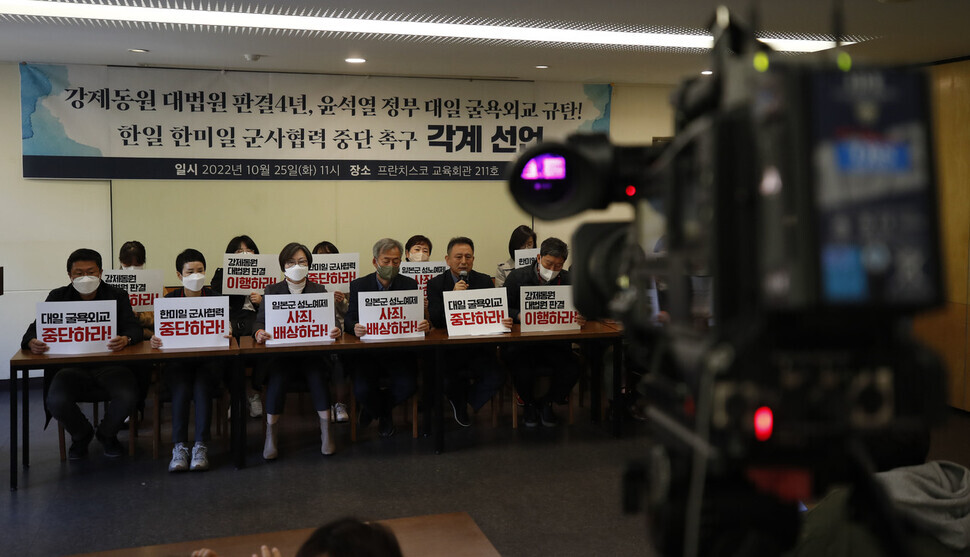
Campaign for Peace and Historical Justice steering committee co-Chairperson Lee Na-young, who is also chairperson of the group Korean Council for Justice and Remembrance for the Issues of Military Sexual Slavery by Japan (Korean Council) commented on the Japanese government’s insulting behavior toward survivors of sexual slavery by the Japanese military, including denials and distortions of its own responsibility for that system.
In the process, the South Korean government has failed to respond proactively, treating the victims and survivors instead as “obstacles to improving South Korea-Japan relations,” she said.
“The Japan Self-Defense Forces event held joint exercises with the South Korean military in the waters near Dokdo, while flying the same ‘Rising Sun’ flag that caused such agony to the late [military sexual slavery victim] Kim Hak-soon, who said, ‘Even the sight of it makes my heart pound and leaves me short of breath,’” she added, stressing that Seoul has gone overboard in cooperating militarily with Japan without having properly resolved the two sides’ historical issues.
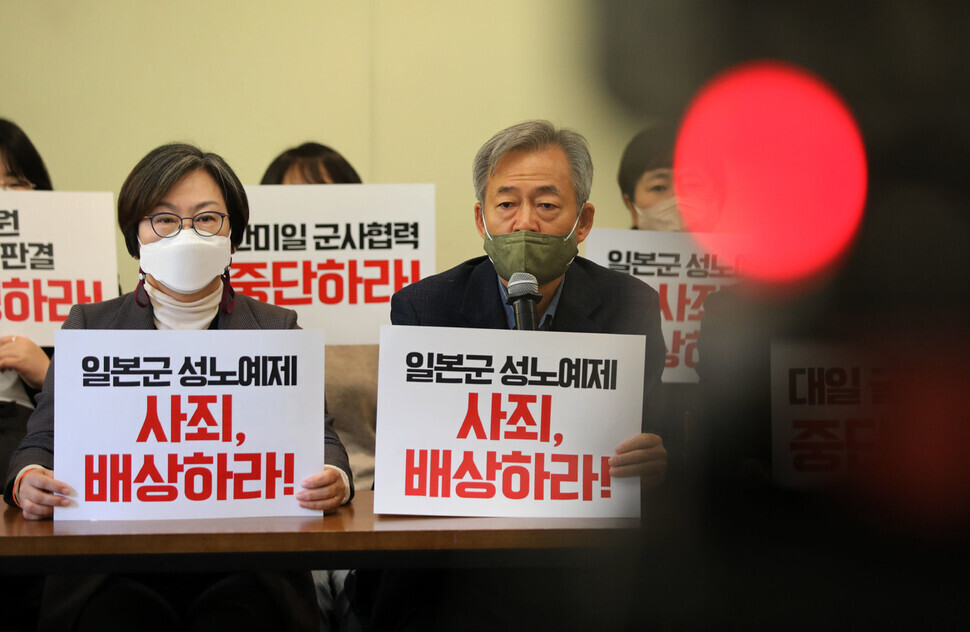
Lee Guk-eon, chairperson of the Citizens Association on Imperial Japan’s Labor Mobilization, commented on recent reports in Japanese media that the South Korean and Japanese governments are discussing an approach where donations to the Foundation for Korean Victims of Forced Mobilization by Imperial Japan are made by South Korean businesses in place of the Japanese companies implicated in war crimes, for use in providing the compensation to victims that the South Korean Supreme Court has ordered the Japanese companies to provide.
Describing this approach as “trampling on the victims’ dignity” and “binding their hands while ignoring them,” he said the two sides were “attempting to put things to bed in such a way that the world does not hear about it.”
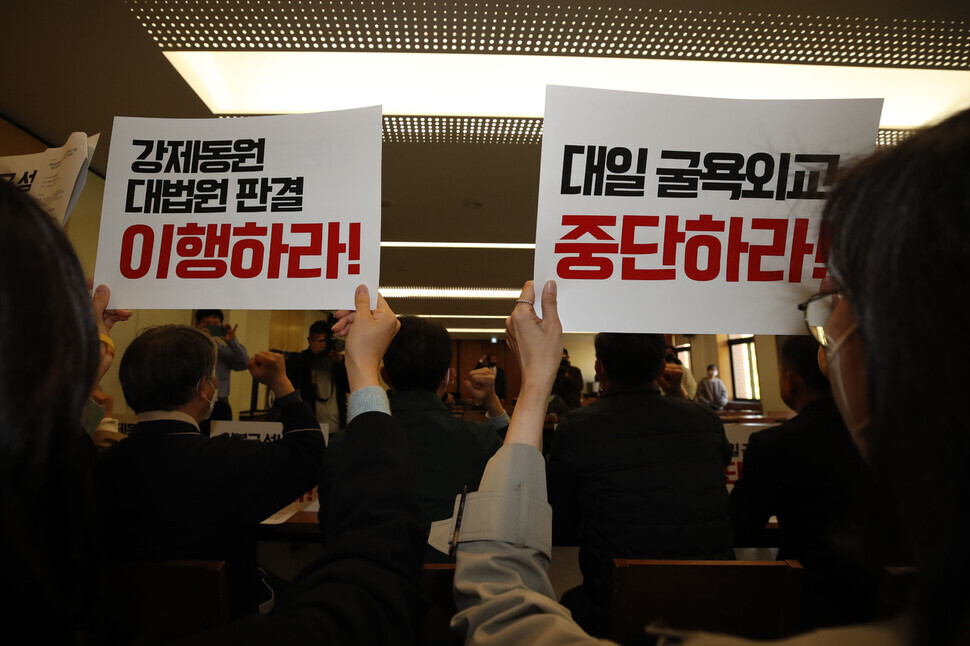
A total of 724 groups and 420 people nationwide took part in a declaration the same day denouncing the Yoon administration’s “submissive” diplomatic approach to Japan and calling for a halt to bilateral and trilateral military cooperation with Japan and the US on the fourth anniversary of the Supreme Court’s forced labor mobilization compensation ruling. These pictures were taken at the event.
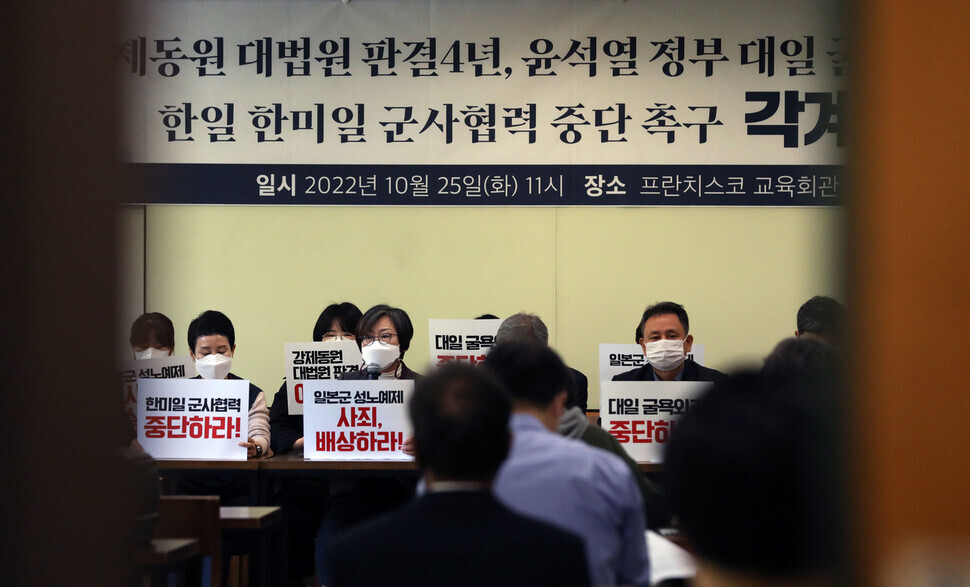
By Kim Hye-yun, staff reporter
Please direct questions or comments to [english@hani.co.kr]

Editorial・opinion
![[Guest essay] Preventing Korean Peninsula from becoming front line of new cold war [Guest essay] Preventing Korean Peninsula from becoming front line of new cold war](https://flexible.img.hani.co.kr/flexible/normal/500/300/imgdb/original/2024/0507/7217150679227807.jpg) [Guest essay] Preventing Korean Peninsula from becoming front line of new cold war
[Guest essay] Preventing Korean Peninsula from becoming front line of new cold war![[Column] The state is back — but is it in business? [Column] The state is back — but is it in business?](https://flexible.img.hani.co.kr/flexible/normal/500/300/imgdb/original/2024/0506/8217149564092725.jpg) [Column] The state is back — but is it in business?
[Column] The state is back — but is it in business?- [Column] Life on our Trisolaris
- [Editorial] Penalties for airing allegations against Korea’s first lady endanger free press
- [Editorial] Yoon must halt procurement of SM-3 interceptor missiles
- [Guest essay] Maybe Korea’s rapid population decline is an opportunity, not a crisis
- [Column] Can Yoon steer diplomacy with Russia, China back on track?
- [Column] Season 2 of special prosecutor probe may be coming to Korea soon
- [Column] Park Geun-hye déjà vu in Yoon Suk-yeol
- [Editorial] New weight of N. Korea’s nuclear threats makes dialogue all the more urgent
Most viewed articles
- 1Yoon’s broken-compass diplomacy is steering Korea into serving US, Japanese interests
- 2[Guest essay] Preventing Korean Peninsula from becoming front line of new cold war
- 3[Column] Why Korea’s hard right is fated to lose
- 460% of young Koreans see no need to have kids after marriage
- 5S. Korean first lady likely to face questioning by prosecutors over Dior handbag scandal
- 6[Guest essay] Maybe Korea’s rapid population decline is an opportunity, not a crisis
- 7[Column] The state is back — but is it in business?
- 8After 2 years in office, Yoon’s promises of fairness, common sense ring hollow
- 9[Reporter’s notebook] In Min’s world, she’s the artist — and NewJeans is her art
- 10[Editorial] Penalties for airing allegations against Korea’s first lady endanger free press